Identifying Superior Businesses for Your Portfolio
Discover how to identify superior businesses for your investment portfolio by understanding industries, evaluating management, and recognizing economic trends.

In my last post, I wrote about about the general rules of the investing game. Now, let’s get a bit more specific. How do you actually find those superstar companies, the ones that really power up our portfolio? It’s like being a talent scout, but for businesses. You’re looking for the ones with the potential to go big and make a bit richer.
Summary
Spotting superior businesses means focusing on understandable industries, backing competent and honest leaders, and choosing firms set to ride long-term positive economic waves.
Key Points
- Invest in businesses you truly comprehend.
- Seek capable and ethical management teams.
- Prioritize companies with strong future economic tailwinds.
Key Takeaways
- Understanding a business is your first filter.
- Great leaders build great, trustworthy companies.
- Long-term trends are more important than short-term noise.
Definition of Key Terms
- Tailwinds: Economic or market conditions that tend to help a business or investment perform well and grow.
- Headwinds: Economic or market conditions that tend to hinder a business or investment, making growth more difficult.
- Intrinsic Value: The estimated "true" value of a company based on its fundamental financial health and future prospects, as opposed to its current stock market price.
- ESOPs (Employee Stock Option Plans): Programs that give employees the right to buy company shares at a set price in the future, serving as a form of compensation and incentive.
- Retained Earnings: The portion of a company's profits that are not paid out as dividends but are kept by the company to reinvest in its business or pay off debt.
- Cost of Capital: The required rate of return a company needs to earn on a project or investment to make it worthwhile. It includes the cost of debt and equity.
- Economic Profit: Profit a company makes that is above its cost of capital. It’s a sign that the company is creating true value for its shareholders.
- Private Ownership Value: The price an informed buyer would be willing to pay to acquire an entire company, as if it were a private business.
Introduction
So, now you're on the hunt to identify great businesses to invest in? This is where the real grind starts. You can’t randomly choose a list of company names to invest in. It’s about becoming a discerning investor, someone who can spot quality. Think of it like choosing ingredients for a gourmet meal; only the best will do if you want an amazing result.
It's far better to buy a wonderful business at a fair price than a fair business at a wonderful price.
So how do we go about comprehending what makes a business wonderful. Let me try breaking it down
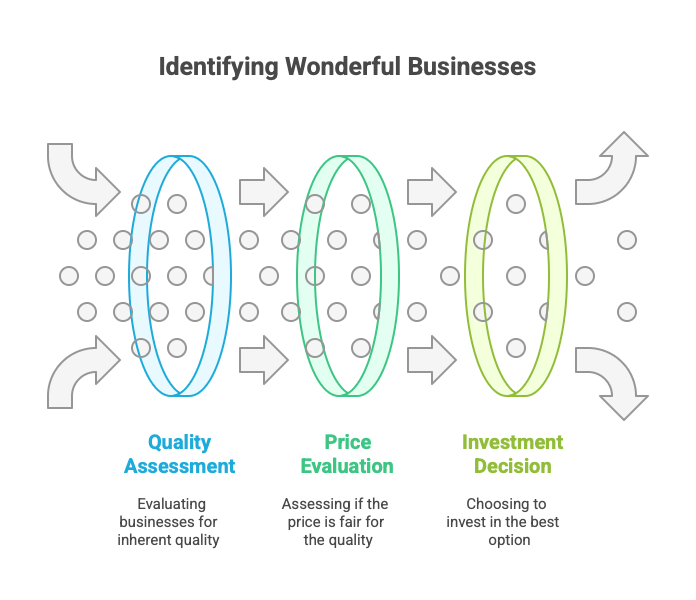
Know What You Own: The Power of Understanding
First off, stick to what you can understand.
Invest only if the company meets the following criteria: ... Industry that is easy to understand and comprehend.
This might sound almost too simple, but it's incredibly powerful.
- Why understanding matters: If you don’t understand how a company makes money, what its products are, who its customers are, and what challenges it faces, how can you possibly judge if it’s a good investment? It's like trying to navigate a new city without a map or knowing the language. You’ll be lost pretty quickly!
- Be a business analyst: You need to "evaluate the business as a business analyst and not as a market or security analyst." This means digging into the business itself – its business model, its competitive advantages, its operational efficiency. Don't just look at the stock price wiggles on a chart.
- Complexity is not your friend: If an industry or a company’s operations are so complex that explaining them feels like rocket science, maybe its better to skip for now. There are thousands of companies out there; find one whose business model clicks with you. Can you explain its business to a friend in a couple of sentences? If not, keep digging or move on.
Think about it – would you buy a local shop if you had no idea how it operated or what it sold? Probably not. Apply that same logic when investing in a company stock
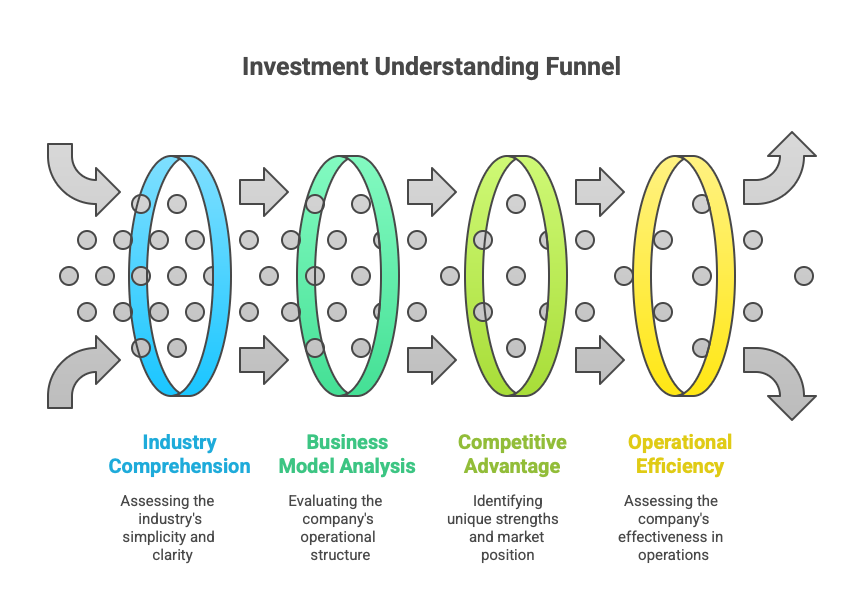
The People Factor: Competent and Honest Management
This one is huge. You’re not just investing in a company; you’re investing in the people who run it. You want leaders who are both smart and trustworthy.
Invest only if the company meets the following criteria: ... Competent and honest management.
What does "Competent" Management Look Like?
- Track Record:
- How has the management team performed in the past?
- Have they navigated challenges well?
- Have they grown the business sensibly?
- Look at their historical performance, not just their promises for the future.
- Operational Excellence:
- Do they run a tight ship?
- Are they efficient?
- Do they allocate capital wisely?
- One sign of this is when every rupee the company retains and reinvests results in at least a similar growth in its market value. That shows they’re creating real value.
- Adaptability: Business is a every changing landscape. Good managers easily adapt and steer the company through new challenges and opportunities.
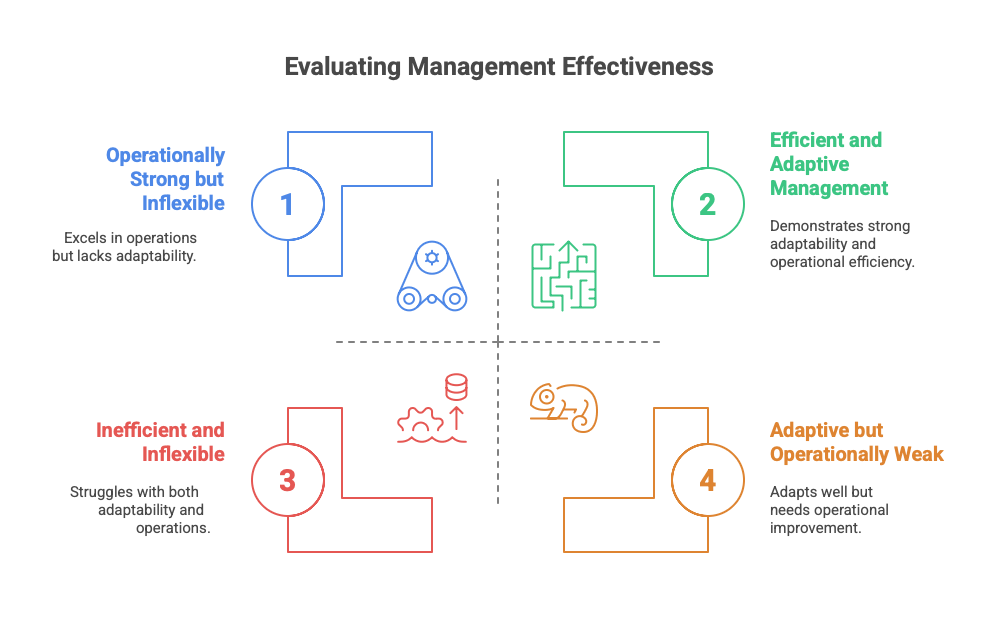
Why "Honest" Management is Non-Negotiable
- Trust is Everything: If you can't trust the management, nothing else matters. Dishonest leaders often cook the books, mislead investors, or enrich themselves at the expense of shareholders.
- Fair Reporting: Avoid firms that don’t follow fair reporting principles. Be wary of companies that:
- Don't properly expense things such as ESOPs (Employee Stock Option Plans).
- Use "fancy" accounting to make results look better than they are.
- Have pension fund assumptions that seem way too optimistic.
- Lack clear footnotes in their financial statements – clear footnotes explain the numbers; vague ones might be hiding something.
- Are always selling super-optimistic projections. No one can predict the future perfectly, and companies that overpromise might be tempted to fudge the numbers later.
- Your Partners: Think of management as your partners in the business. You’d want partners who are straightforward, hardworking, and have your best interests at heart, right?
When you find a company with leaders who are both stars at running the business and straight as an arrow in their dealings, you’ve found something special. How good a job has the management done based on the economic situation presented to them? Compare them with their peers to see how they stand out. This is one of the key questions you should always ask.
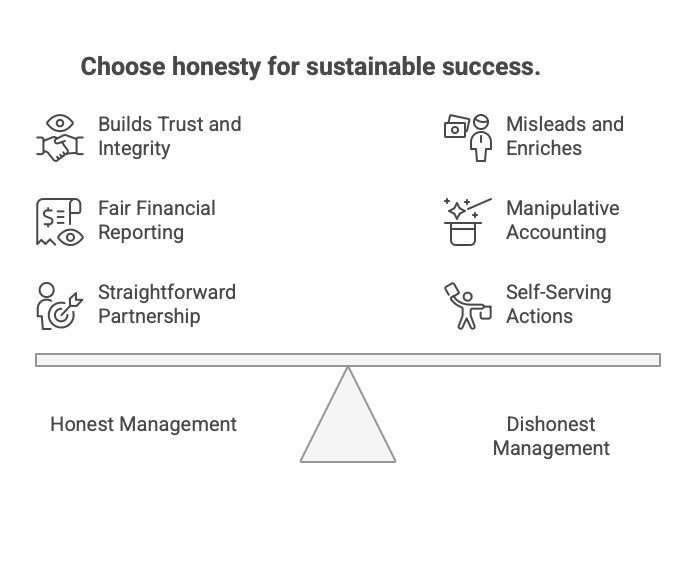
Riding the Wave: Favorable Economic Winds
Even a great ship with a great captain can struggle in a terrible storm. That's why you want to find businesses that are set to benefit from long-term favorable economic conditions – more tailwinds than headwinds.
Invest only if the company meets the following criteria: Favorable economic scenario - more tailwinds than headwinds expected.
What are Economic Tailwinds?
These are broad trends that help a company or industry grow. Think about:
- Growing Demand: Is there a rising long-term demand for the company's products or services? (e.g., renewable energy, healthcare for an aging population, digital services).
- Technological Advancements: Is the company leveraging new technologies that give it an edge or open up new markets?
- Supportive Regulations (or lack of harmful ones): Sometimes government policies can provide a boost to certain industries.
- Changing Consumer Habits: Are people’s preferences shifting in a way that benefits the company?
Why Long-Term Matters
- Don't get too caught up in short-term economic forecasts or market jitters. The goal is to find businesses whose fundamental prospects are so strong that they can thrive over years, not just a few months.
- A truly superior business, offering real value, can often weather recessions better than its weaker competitors. If an asset is valuable, it will likely be used even in a recessionary period. Your focus should be on what the asset is producing, not on the daily mood swings of the market.
Assessing the Economic Landscape
- Look at the industry the company operates in. Does it have a bright future?
- Consider the broader economic picture. Are there any major, long-term shifts that could significantly help or hinder this business?
- Remember, you’re looking for a business that has the wind at its back, making its journey smoother and faster.
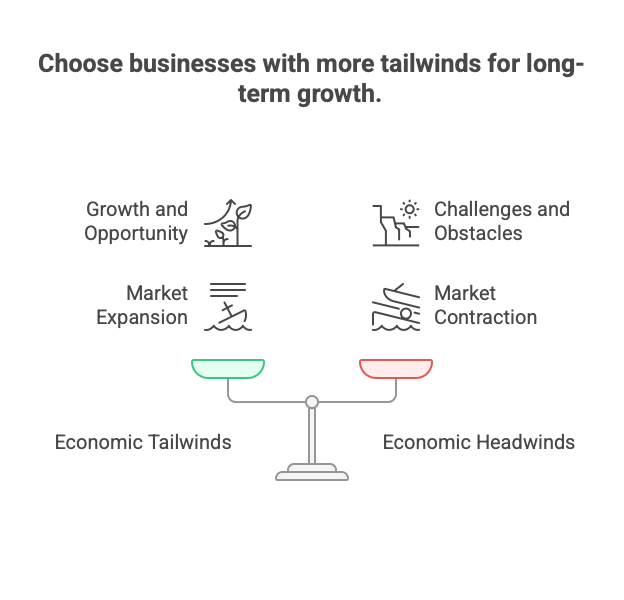
The Price is Right (or at Least, Fair)
So you've found an understandable business with great management and favorable tailwinds. Fantastic! But there's one more crucial piece: the price.
It's far better to buy a wonderful business at a fair price than a fair business at a wonderful price,
Always bear in mind that your should never overpay, even for a wonderful business. A sound investment morphs into a rash speculation if it's purchased at an elevated price.
- What's it worth? Before investing, try to get a rough idea of what the company is truly worth (its intrinsic value). This is one of the three key questions: What's the company worth approximately?
- Bargain Hunting Sensibly: If a business you’ve identified as "wonderful" sees its price drop due to general market pessimism (not because something is wrong with the company itself), that could be a great opportunity to invest more or initiate a position.
- Attractive Purchase Price: Does the current stock price look attractive compared to what it might cost to build a similar business from scratch (its private ownership value)? You’re looking for situations where the market might be undervaluing the company.
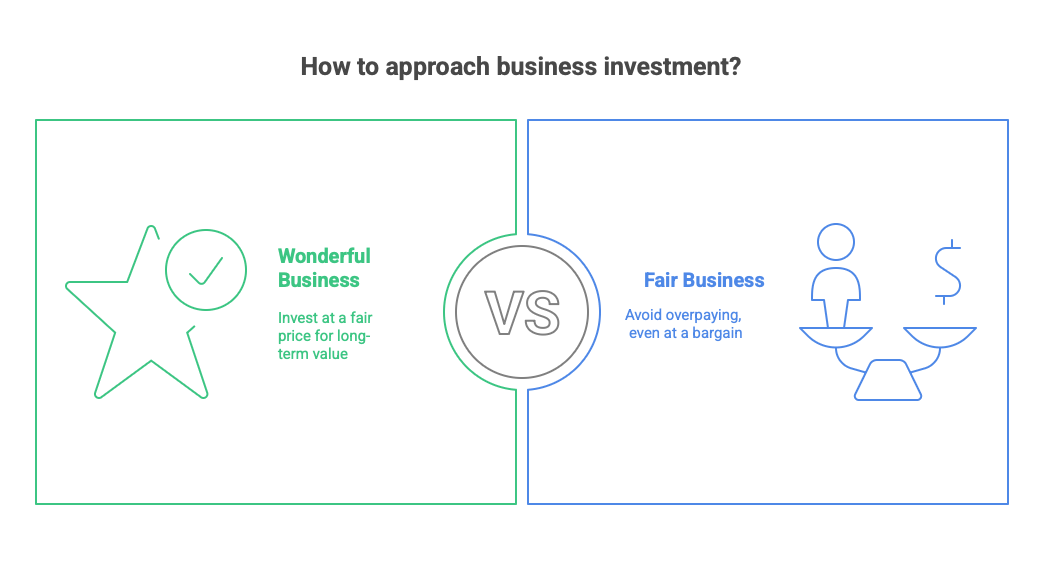
Putting It All Together: The Superior Business Profile
A superior business, therefore, tends to have these characteristics:
- It operates in an industry you can get your head around.
- It's led by a team that knows what it's doing and does it ethically.
- It's well-positioned to benefit from positive long-term economic trends.
- It generates good economic profit, meaning it earns more than its cost of capital.
- It uses retained earnings effectively to grow its market value.
- You can buy it at a price that makes sense given its quality and prospects.
When you evaluate such a company, also ask:
- What's the likelihood that the company will be able to meet its future obligations? (Is it financially stable?)
- How good of a job has the company management done based on the economic situation presented to them? (Compare with their peers to see how they stand.)
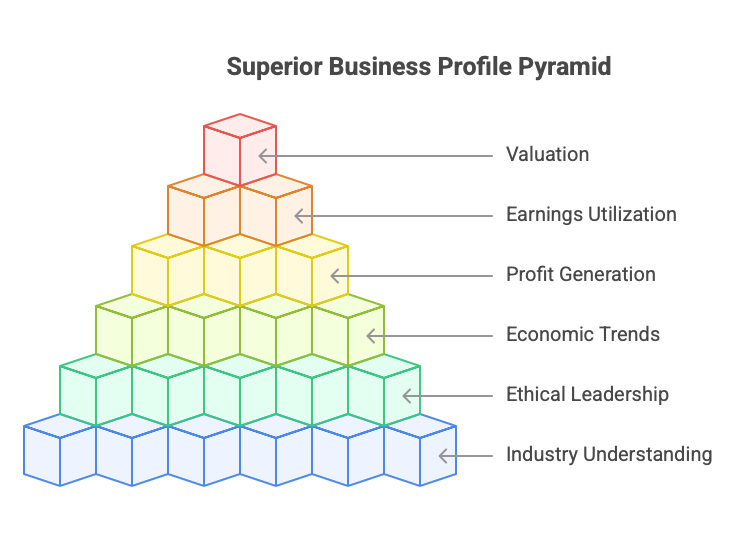
Conclusion: Becoming a Quality Hunter
Identifying superior businesses to invest isn’t always easy. It takes work, patience, and a commitment to your principles. But the rewards, both in terms of potential returns and peace of mind, can be substantial. You’re not just buying stocks; you’re becoming a part-owner in high-quality enterprises.
Feeling a bit overwhelmed by all this investing talk? That's perfectly normal! If the idea of deep-diving into company analysis feels like a mountain to climb right now, a smart first step is to start your investment journey with Index Funds. Once you're more comfortable with how investing works, you can definitely look into picking specific promising companies.
Let me share a bit of my own story to show you what I mean. Back in 2009, after reading the classic book The Intelligent Investor, I had a realization: figuring out exactly which companies to invest in through detailed analysis was quite challenging for me at the time. So, I decided to keep it simple and started a monthly SIP in a Nifty Index Fund. The result? That investment has delivered an impressive 18.3% CAGR (Compound Annual Growth Rate) as of today. It's a good reminder that a straightforward approach can be really powerful!